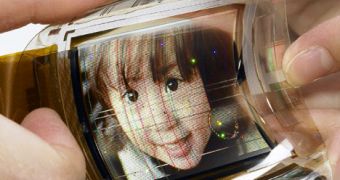When you hear 'plastic' the first thing that probably comes to your mind is 'electrical insulator'. This is perhaps because most plastics have exceptional electrical insulator properties, albeit this doesn't necessarily mean that all plastics share the same properties. It was proven some three decades ago that certain classes of plastics may conduct electricity and could be used to create some of the most amazing electronic devices ever seen, such as flexible laptops, electronic billboards or ultra-thin displays.
Imagine an electronic device made of plastic material only. The creation of such a piece of equipment would most certainly revolutionize the electronics industry. Let's take the humble transistor for example, the building block of every electronic device today. Although it is usually made out of silicon, a lot of semiconductor materials can be used to manufacture transistors, neither of which very flexible. However, flexibility is not the only issue with transistors. By using plastics to build transistors the manufacturing costs could also drop considerably.
The same applies when it comes to conventional light-emitting displays. Most displays currently available are still pretty rigid, but by replacing them with organic light-emitting displays, not only would consumer electronics become much more flexible and cheaper to make, but they would also consume a lot less energy. No wonder all major electronics companies take their research towards these two key aspects.
And the application field of conductive plastics doesn't stop here. One day, for example, they may be used to create sensitive and flexible materials that could replicate skin for highly advanced robots that make use of one of man's key senses: touch.
"We expect that, for many applications, these materials will gradually replace silicon and metals, and they may even make possible entirely new technologies, particularly in the field of bionics, which seeks to link up technology with biological systems," write researchers of the School of Physics and Astronomy at Tel Aviv University and from the Electrical and Computer Engineering Department at Ben Gurion University in an recently published article.

 14 DAY TRIAL //
14 DAY TRIAL //